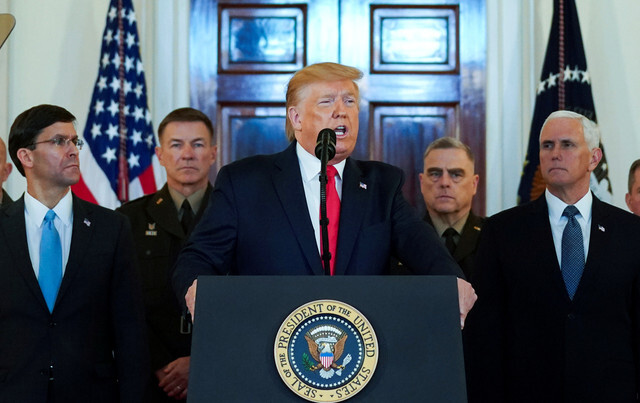hankyoreh
Links to other country sites 다른 나라 사이트 링크
[Correspondent’s column] Iran strike shows Trump’s increasing volatility

As we roll into 2020, people around the world have been anxiously following events in Washington, DC. Just when it seemed that the likelihood of a clash between North Korea and the US — based on North Korea’s threat of a “Christmas present” — was fading, US President Donald Trump suddenly brought the world to the brink of war with an airstrike that killed Qasem Soleimani, a top Iranian general. For the past several days, people in Washington have been fretting over text messages sent from the school district instructing students to head home early because of snow in the forecast, prompting paranoia that the snow may not be the real reason. Better stay away from downtown Washington and New York, people said, half in jest and half in earnest.
We’re extremely lucky that Trump refrained from making an armed response to Iran’s missile attack on Iraqi bases housing US troops. Once again, we see the pattern of behavior that Trump exhibited with China and North Korea: he created the crisis himself, ratcheting up tensions only to lower them again and declare a victory. But whatever the case, we dodged a war.
While we may have avoided the worst-case scenario, that’s no reason to relax. The Iran crisis tied together the elements of uncertainty that have built up during Trump’s three years in office — an impetuous decision, emerging from a murky process and backed by doubtful evidence; a team of advisors, more and more of whom are yes-men; and low trust in Trump, both in the US and abroad. Such weaknesses are likely to spell trouble for people around the world during the imminent impeachment trial and the upcoming presidential election in November.
The Trump administration said the decision to take out Soleimani was based on an imminent threat, but lawmakers who were briefed by the administration complained of a lack of evidence and said they hadn’t heard anything more concrete than what was reported by news outlets. When Trump threatened to strike 52 sites in Iran, authorities admitted that they hadn’t even finished analyzing those sites. American experts have raised doubts about whether Trump pondered the consequences of killing Soleimani, such as the vicious cycle of retaliation that might ensue. The most persuasive explanation of Trump’s motivation is that he wanted to “look strong.”
Whenever this sort of thing happens, many Americans say that former Secretary of State Rex Tillerson or former Secretary of Defense James Mattis would have nipped it in the bud, if they were still around. Trump’s current batch of foreign policy and security advisors — figures such as Secretary of State Mike Pompeo, Secretary of Defense Mark Esper, National Security Advisor Robert O’Brien, and Chairman of the Joint Chiefs Gen. Mark Milley — are much more biddable, they say.
Furthermore, since Trump’s domestic approval rating has remained above 40%, his critics have never been able to crack 60% so far in his presidency. On the international stage, he’s weakened relationships by raising tariffs, demanding its allies cough up more cash for defense, and shredding multilateral agreements, such as the Iran nuclear deal. The nexus of his impulsive behavior and a shortage of trust, both at home and abroad, is leading to greater instability.
What we ought to be worried about in regard to North Korea-US relations is not the possibility of Trump using the military option against the North Korean regime, but more fundamental questions — whether Trump had a plan and a genuine commitment to establishing peace and denuclearizing the Korean Peninsula when he initiated dialogue with North Korea, and if so, whether finding a solution is still a passion and a priority for him. A list of Trump’s achievements during his first three years in office, released by the White House at the end of the year, devoted little space to North Korea, only mentioning Trump’s two summits with North Korea, the fact that he was the first president to cross the DMZ and step foot on North Korean soil, and maintaining sanctions. An uncharitable reading is that Trump is starting to lose interest in North Korea’s “useful value.” In the upcoming months, Trump is likely to view everything through the lens of how it contributes to his reelection campaign, and there’s no telling how he’ll approach North Korea.

In 2020, the world will have to put up with an American president who’s even more volatile and inflammable than he has been over the past three years. It’s going to be a bumpy road, and it’s time we all buckled up.
By Hwang Joon-bum, Washington correspondent
Please direct comments or questions to [english@hani.co.kr]

Editorial・opinion
![[Editorial] Yoon must halt procurement of SM-3 interceptor missiles [Editorial] Yoon must halt procurement of SM-3 interceptor missiles](https://flexible.img.hani.co.kr/flexible/normal/500/300/imgdb/child/2024/0501/17145495551605_1717145495195344.jpg) [Editorial] Yoon must halt procurement of SM-3 interceptor missiles
[Editorial] Yoon must halt procurement of SM-3 interceptor missiles![[Guest essay] Maybe Korea’s rapid population decline is an opportunity, not a crisis [Guest essay] Maybe Korea’s rapid population decline is an opportunity, not a crisis](https://flexible.img.hani.co.kr/flexible/normal/500/300/imgdb/original/2024/0430/9417144634983596.jpg) [Guest essay] Maybe Korea’s rapid population decline is an opportunity, not a crisis
[Guest essay] Maybe Korea’s rapid population decline is an opportunity, not a crisis- [Column] Can Yoon steer diplomacy with Russia, China back on track?
- [Column] Season 2 of special prosecutor probe may be coming to Korea soon
- [Column] Park Geun-hye déjà vu in Yoon Suk-yeol
- [Editorial] New weight of N. Korea’s nuclear threats makes dialogue all the more urgent
- [Guest essay] The real reason Korea’s new right wants to dub Rhee a founding father
- [Column] ‘Choson’: Is it time we start referring to N. Korea in its own terms?
- [Editorial] Japan’s rewriting of history with Korea has gone too far
- [Column] The president’s questionable capacity for dialogue
Most viewed articles
- 1Months and months of overdue wages are pushing migrant workers in Korea into debt
- 2At heart of West’s handwringing over Chinese ‘overcapacity,’ a battle to lead key future industries
- 3Seoul getting its first-ever vertical farm
- 4Trump asks why US would defend Korea, hints at hiking Seoul’s defense cost burden
- 5[Column] For K-pop idols, is all love forbidden love?
- 6[Editorial] When the choice is kids or career, Korea will never overcome birth rate woes
- 7[Editorial] Yoon must halt procurement of SM-3 interceptor missiles
- 8[Editorial] 10 years on, lessons of Sewol tragedy must never be forgotten
- 9Under conservative chief, Korea’s TRC brands teenage wartime massacre victims as traitors
- 10[Guest essay] Maybe Korea’s rapid population decline is an opportunity, not a crisis